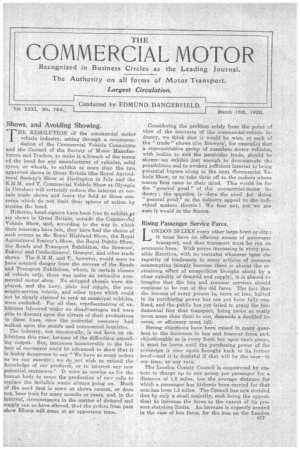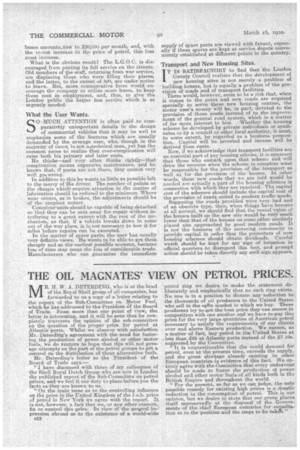Shows, and Avoiding Showing.
Page 1

Page 2

If you've noticed an error in this article please click here to report it so we can fix it.
THE RESOLUTION Of the commercial motor vehicle industry, acting through a recommendation of the Commercial Vehicle Committee and the Council of the Society of Motor Manufacturers and Traders, to make it 4 breach of the terms of the bond for any ra-anufacturer of vehicles, solid tyres, or wheels, to exhibit at more than the two. approved shows in Great Britain, (the Royal Agricultural Society's Show at Darlington in July and the g.M.M. and T. Commercial Vehicle Show at Olympia in October) will certainly reduce the interest at certain trade shows and leave the field to those concerns which do, not limit their sphere of action by signing the bond.
• Hitherto, bond-signers have been free to exhibit it Six shows in Great Britain, outside the Commercial Vehicle Show, and, according to the way in which their interests have lain, they have had the choice of such events as the Royal Highland Show, the Royal !Agricultural Society's Show, the Royal Dublin Show, the Roads and Transport Exhibition, the Brewers', Bakers' and Confectioners', Grocere, and other trade shows. The S.M.M. and T., however, would seem to have scented danger fromthe success of the Roads , and Transport Exhibition, where, in certain classes of vehicle only, there was quite an extensive commercial motor show. No stripped chassis were displayed, and the lorry, plain and simple, the passenger-service vehicle, and other types which could not be clearly claimed to rank as municipal vehicles, were excluded. • For all that, repre-sentatives of exhibitors laboured under no disadvantages and were able to descant upon the virtues of their productions in those lines, once the potential customer had walked upon the stands and commenced inquiries. The industry, not unnaturally, is not 'keen on exhibitions this year, because of the difficulties attending output. But, instances innurnerable in the history of commerce could be advanced to show that it is highly dangerous to say "We have as many orders as we can execute ; we do not wish to extend the knowledge of our products, or to interest any new potential customers." It were as unwise as for the human body to cease the production of new cells to replace the invisible waste always going on. Much of the seed that is sown at shows cannot, or does not, bear fruit for many months or years, and, in the interval, circumstances in the matter of deMand and supply can so have altered, that the orders from past show &Torts will come at an opportune time. Considering the problem solely from the point of view of the interests of the commercial-vehicle industry, we think that it would be wise, at each of the " trade " shows (the Brewers', for example) that a representative group of nameless motor vehicles, with bodies to suit the particular trade, should be shown—an exhibit just enough to demonstrate the possibilities and to awaken sufficient interest to bring potential buyers along th the next Commercial Vehicle Show, or to take them off to the makers whose names first caane to their mind. This would be for the "general good" of the commercial-motor industry; the question is—does the need for doing "general good" to the industry appeal to the individual makers 'therein? We fear not, yet we are sure it would in the Stated.
Rising Passenger Service Fares. .
LONDON IS LIKE every other large town or city ; it must have an efficient means of passenger transport, and that transport must be run on economic lines.. With prices increasing in ever' possible direction,with no restraint whatever upon the rapacity of tradesmen in many articles of common consumption (simply because there is absent the restraining effect of competition brought about by a, close equality of demand and supply), it,is absurd to imagine that the bus and tramcar services should continue to be run at the old fares. The fact that the income of every person is, more or less, halved in its purchasing power has not yet been fully rea. used, and the public has yet failed to grasp the fundamental fact that transport, being twice as costly (even more than that) to run, demands a doubled income, or efficiency, must fall.
Strong objections have been raised in many quarters to the increases in bus and tramcar fares and, objectionable as is every fresh tax upon one's purse, it must he borne until the purchasing power of the sovereign is once again brought back to its former level—and it is doubtftd if that will be the ease—in our time, at any rate.
The .-London County Council is empowered by statute to charge up to one penny per passenger for a distance of 1.2 miles, but the average distance for which a passenger has hitherto been carried for that sum has been 1.5 miles. The Council has now decided (btrt by only a small majority, such being the opposition) to increase the fares to the extent of its present statutory limits." An increase is urgently needed in the case of bus fares, for the loss on the London
buses amounts,now to 190,000 per month, and, with ' the recent increase in the price of petrol, this less _. must increase. _ What i8 the obvious result? The L.G.O.C. is discouraged from putting its full service on the streets. Old members of be staff, returning from war service, are displacing those who were filling their places, and the latter, to the extent of 500, are under notice
_.to leave. But, more remunerativefares would encourage the, company to utilize more buses, to keep these menin employment, and, thus, to give the London public the better bus service which is so urgently needed.
What the User Wants.
SO MUCH ATTENTION is often paid to cornparativaly unimportant details in the design of commercial vehicles that it may be well to emphasize some of the features which are usually demanded by the average user, who, 'though in the majority of cases; is not astechmeal man, yet has the common sense to realize that over-complication will raise both his primary and later costs.
He thinks—and very often thinks rightly—that complication means expensive maintenance, and he knows that, if parts are not .there, they cermet very well gosevrong. .
In addition to this he wants as little as possible left to the mercy of 1e driver. The number of points on the chassis which', requireatteption in the matter of lubrication should be reduced to the minimum. Where wear occurs, as in brakes, the adjustments should be of the simplest nature.
Completeunits should be capable of being detached so that they can be sent away for repair without interfering to a great extent with the rest of the mechanism, so that, if a vehicle breaks down in some out of the way place, it isnot necessary to tow it for miles 'before repairs can be-. executed. In the matter of spire parts, the user has usually very definite views. He wants to be able to get them cheaply and -at theeiarlieet possible moment, because Toss of time May mean the loss of considerable trade. Manufacturers who can guarantee the immediate supply of spare parts are viewed with favour, especially if these spares are kept at service depots conveniently established at different points in the country.
Transport and New Housing Sites.
IT IS SATISFACTORY to find that .the London County Council realizes that the development of new housing sites is not merely a problem of building houses, but is equally a problem of the provision of roads and of transport facilities.
There would, however, seem to be a risk that, when it comes to the point and new roads are required specially to serve these new housing centres, the motor user's money will be, in part, devoted to the provision of those roads instead of to the improvement of the general road system, -which is a matter of far more interest to him. Whether the housing scheme be -developed by private individuals or syndicates or by a council or other local authority, it must, to some .extent, be regarded as a business proposition. Capital will be Invested and income will be derived from rents. Now, if we acknowledge that transport facilities are an essential part of any housing scheme, it is apparent that those who embark upon that scheme and will drew the revenue when thescheme is complete mast • be responsible for the provision of the transport as well as for the provision of the houses. In other words, these new roads that we are told would be needed are actually a part of the housing schemes in connection with which they are required. The capital cost of the schemes should include the capital cost of the provision of roads suited to modern traffic needs. Supposing the roads provided were very bad and of an obsolete type, then, when things have become at all normal, we should find that the rental value of the houses built on the new site would be very much lower than that of the houses on seine other similarly placed site approached by good modern roads. It is not the business of the motoring community to provide capital in order that the promoters of new housing schemes should obtain dividends. Careful wateh should be kept for any sign of intention in official quarters to disregard this feet, and prompt action should be taken directly any such sign appears.


























